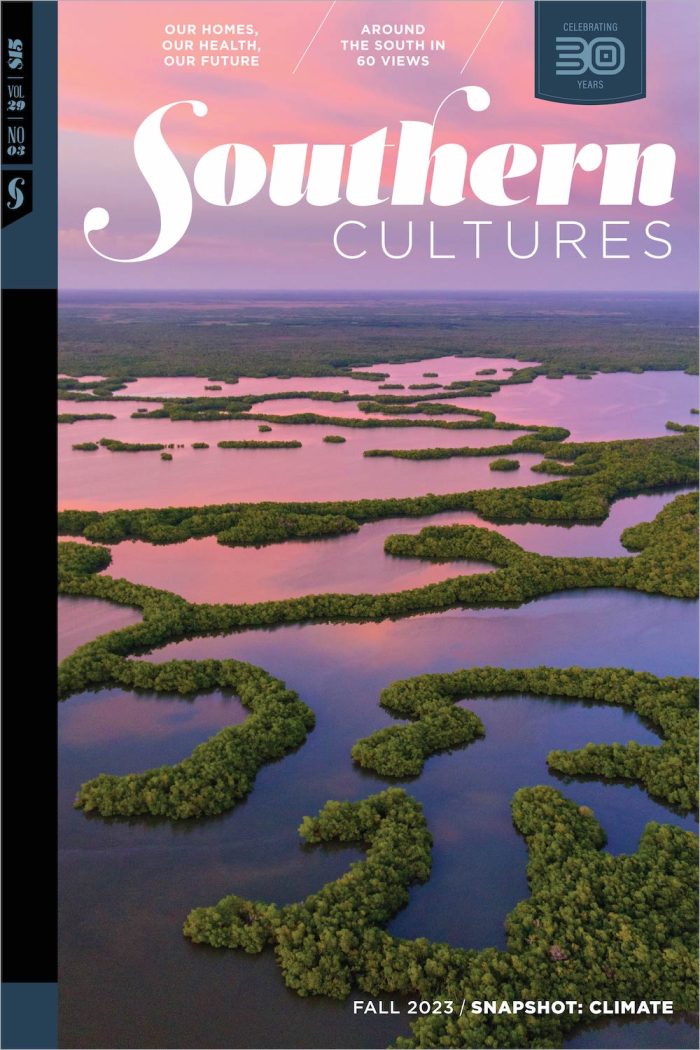Inaugural Issue
by John Shelton Reed,
Harry L. Watson
As we start to celebrate our 25th year of publication, we look back at the first essay in our inaugural issue. Welcome to the first issue of Southern Cultures, a new quarterly of the American South. As always, the South attracts a considerable share of attention today, from defenders and detractors, reformers and traditionalists, historians, »
Essay
Building a Southern Past, 1885–1915
by Catherine W. Bishir
In light of the events in Charlottesville on Saturday, August 12, we share this excerpted essay from our 1993 inaugural issue. In 1901, the speaker at the dedication of the Olivia Raney Library in Raleigh, North Carolina, compared the city’s landmarks with those of Washington, D.C. In the national capital, “three great architectural monuments” possessed »
by Michael Montgomery
“Are the days of the southern accent or the southern dialect in fact numbered?” In May of 1986, newspapers throughout the South ran a feature story about a southern linguist who’d been researching the region’s speech. Local papers topped the story with catchy headlines like “Southern Accent Here to Stay,” “Ain’t No Cause fuh Alahm, »
by Elizabeth Fox-Genovese
“With virtually each passing year, the South’s representation in the humanities becomes more elusive.” With virtually each passing year, the South’s representation in the humanities becomes more elusive. To be sure, programs in “southern studies” abound, and some scholars continue to specialize in southern history or literature. But the South that figures in their pages »
by Sherman A. James
“The narrative that follows is a quintessential American story.” I first met John Henry Martin in the summer of 1978, five years after I had joined the faculty in the School of Public Health of the University of North Carolina at Chapel Hill. Our meeting was arranged by a mutual acquaintance, a perceptive public health »
by Jim Carnes
Gainesville: University Press of Florida, 1992. Texas A&M University Press, 1992. By the late nineteenth century, virtually every Main Street in the United States boasted a photographer’s shingle. No longer did small-town newlyweds, graduates, and decorated veterans have to seek an itinerant cameraman or venture to a metropolis in order to declare themselves in the »
by William L. Barney
University of Missouri Press, 1992 Southern Stories, a collection of ten essays published over the past fifteen years, provides a dazzling platform for the elegant skills of Professor Faust in intellectual and cultural history. Evenly balanced in their treatment of the antebellum and Civil War South and the gendered realities of men and women, the »
by Suzanne Lebsock
University of North Carolina Press, 1992 When Jefferson Davis published his hefty history of the Confederate government in 1881, he dedicated it to the “WOMEN OF THE CONFEDERACY,” praising their services as nurses, their “domestic labors,” their “faith,” their “fortitude,” and their “patriotism.” Such tributes were legion in southern letters, having first appeared about ten »
by Dolan Hubbard
University of Missouri Press, 1991 The thirteen essays in Home Ground explore ways in which “a sense of family and a sense of place are wedded in Southern autobiography.” They blend the personal with the critical as they offer us an intimate critique of how the South shapes our imagination and makes us heir to »
by Robert C. McMath
Oxford University Press, 1992 Edward Ayers confesses that while he was working on The Promise of the New South “someone else’s book was never far from my mind.” For more than forty years, C. Vann Woodward’s magisterial Origins of the New South, 1877-1913 has never been far from the minds of those who write about »
by Wayne Martin
1/2″ video format, 28 minutes, color. Appalshop Inc., 306 Madison Street, Whitesburg, KY 41858. Morgan Sexton (1911-1991)—logger, miner, and musician—lived all of his life in the coal country of southeastern Kentucky. As a boy, Sexton sang ballads and love songs learned from family members and local musicians. He also mastered a two-fingered method of picking »
by Chris Wilson
University of Georgia Press, 1991 The study of the vernacular architecture of the United States flourished as never before during the 1970s and 1980s. The establishment of the National Register of Historic Places in 1966 and the subsequent funding of state historic building surveys unleashed architectural historians, cultural geographers, folklorists, and historic preservationists on cities, »
by Richard A. Pride
University of North Carolina Press, 1992 This book is interesting for the story it tells, the story that it fails to tell, and the story it ought to have told but didn’t. There is no confusion, though, about the central fact: David Duke, an articulate if wily racist, attracted a majority of Louisiana’s white voters »
by Carl Abbott
Oxford University Press, 1991 This thoroughly documented and clearly argued book is true to its subtitle. Bruce Schulman’s explicit purpose is to trace the variety of deliberate and inadvertent ways in which the federal government helped to transform the economy of the South in the middle decades of this century. His implicit goal is to »
by John Shelton Reed
“Richard Weaver observed once that the religious ‘solid South’ preceded the political one; and apparently it will be longer lived, as well.” Richard Weaver observed once that the religious “solid South” preceded the political one; and apparently it will be longer lived, as well. Many surveys have documented the religious distinctiveness and relative homogeneity of »
by David Moltke-Hansen
“Despite the vision and commitment behind them, these initial efforts were too meagerly funded to go far toward solving a critical problem of southern studies: the scarcity of accessible original sources, print as well as manuscript.” In 1901, Alabama created the first state archives in the United States, followed quickly by many other southern states. »





